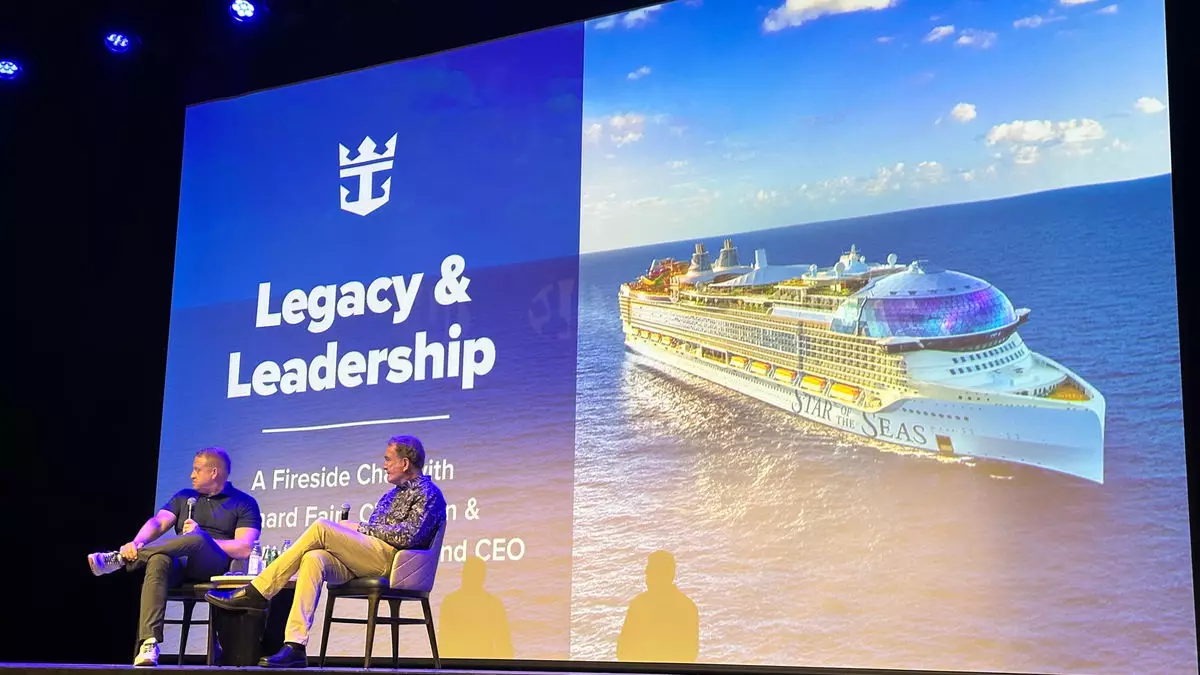In the realm of luxury travel and maritime innovation, leadership plays a pivotal role in shaping not only the trajectory of a company but also the experiences of countless travelers. The recent onstage dialogue between Royal Caribbean Group’s CEO, Jason Liberty, and the venerable Richard Fain—who served as the guiding force behind Royal for over three decades—serves as a compelling case study in how leadership evolution, rooted in a strong organizational culture, can steer a global brand into the future. Their exchange, laced with wit and mutual respect, underscores a fundamental truth: enduring success stems from cultivating a resilient, people-centric culture that adapts and innovates with purpose.
Liberty’s reflective question, “How am I doing?” and Fain’s witty retort, “You’re asking that about four years too late,” exemplify the humility and humor necessary for authentic leadership. This banter encapsulates the essence of leadership that is not only introspective but also anchored in experience. The narrative reveals that Royal Caribbean’s ascendancy has been driven by a commitment to fostering an organizational environment where talented individuals thrive and aspire, reinforcing the idea that people are the true cornerstone of any successful enterprise. Fain’s unwavering emphasis on culture and personnel as the ultimate sources of inspiration is a testament to his belief that leadership is a continuous, collective effort—not a solitary achievement.
Building a Culture of Excellence and Long-Term Thinking
Throughout the discussion, Fain’s perspective on corporate culture offers a blueprint for sustainable growth. He underscores that creating a cohesive, inclusive environment where innovation and collaboration flourish is essential. The statement, “It’s the culture that makes it successful,” resonates as a reminder that technological advancements and novel amenities, while enticing, are secondary to the foundational human elements that drive a service-oriented industry like cruising.
Furthermore, Fain advocates for a strategic outlook that transcends immediate gains. His criticism of short-termism—highlighting that today’s actions should be viewed through the lens of five years from now—reflects a sophisticated understanding of industry cycles and consumer behavior. In a rapidly changing world, the capacity to anticipate trends and align the company’s long-term vision with evolving guest expectations distinguishes industry leaders from fleeting innovators. This approach demands a delicate balance: to stay true to core values while remaining agile enough to pivot and embrace new opportunities.
The Power of Cohesive Innovation
Innovation within Royal Caribbean, as portrayed in the conversation, is not rooted in isolated “wow” factors but in the integration of ideas into a seamless experience. The anecdote about the ill-fated blimp in the Oasis of the Seas illustrates a broader point: bold ideas must be evaluated through the lens of feasibility and safety, yet the creative process itself often sparks better, more practical solutions. The eventual success of the balloon project at Perfect Day at CocoCay exemplifies this philosophy—transforming a whimsical concept into a tangible, memorable feature that enhances the guest experience.
This highlights a critical insight: genuine innovation requires taking risks, learning from failures, and fostering a culture where experimentation is welcomed. For Royal Caribbean, blending technology, entertainment, and personalized experiences creates a cohesive narrative that appeals to modern travelers seeking memorable moments, rather than mere sightseeing. The industry’s evolution toward immersive, shareable encounters—moving beyond superficial city tours—reflects this shift. Travelers today are craving authentic, experiential moments that resonate emotionally and socially, and cruise lines must craft these narratives thoughtfully.
From Ships to Shores: The Future of Vacationing
Looking ahead, Fain challenges Liberty by emphasizing that the future of cruising hinges on defining what the ultimate guest experience will be. The enduring relevance of a travel brand depends on its ability to innovate in ways that foster genuine engagement and connection. Liberty’s vision of transforming traditional tours into immersive, memorable adventures—whether on the grandest ships or the emerging river cruise vessels—captures this zeitgeist. The focus on building shared memories with friends and family underscores a broader societal shift toward valuing meaningful interactions over transactional experiences.
What emerges from their dialogue is a compelling narrative: the future of leisure travel lies in creating personalized, shareable moments that elevate the ordinary into the extraordinary. As technology makes it easier to capture and broadcast experiences, cruise lines that facilitate authentic storytelling will forge stronger bonds with their guests. This consumer-driven evolution necessitates a radical rethinking of product design, marketing, and service delivery—an ongoing journey that will require bold leadership and an unwavering commitment to cultural excellence.
Leadership in a Changing Industry
Liberty’s tenure, as juxtaposed with Fain’s legacy, exemplifies a new generation of leadership that is confident yet humble. Fain’s playful yet incisive feedback indicates the importance of continuous learning and self-awareness. His remark about the share price, employee satisfaction, and product popularity being signs of Liberty’s effective stewardship underscores that leadership success is measurable and multifaceted.
However, the real challenge lies in maintaining this momentum. The cruise industry faces increasing competition from land-based alternatives, shifting traveler preferences, and environmental concerns. Leaders must craft strategies that not only sustain profitability but also uphold environmental integrity and social responsibility. The current trajectory suggests that innovation—whether through technological integration, experiential design, or operational excellence—will be the defining factor of future success.
In the end, effective leadership in this evolving industry demands a clear vision, a vibrant organizational culture, and a willingness to take risks—all grounded in a genuine understanding of what customers truly value. The future is not about chasing fleeting trends but about embedding meaningful innovation into the fabric of the experience, driven by leaders who understand that the most powerful stories are those rooted in authenticity and shared human connection.


Leave a Reply